Professional Identity 92434 Case Study: Jessica Wilson's Dilemma
VerifiedAdded on 2022/09/23
|7
|1770
|45
Case Study
AI Summary
This case study examines the ethical and legal challenges faced by a nurse, Sam, in the case of Jessica Wilson, a 15-year-old girl who faints during a school trip and is suspected of being pregnant. The assignment delves into the ethical dilemma Sam faces regarding patient confidentiality, the minor's right to make decisions, and the nurse's duty to inform the parents. It explores relevant ethical principles from the International Council of Nurses' Code of Ethics, along with Australian legal frameworks concerning minors' consent to medical treatment and confidentiality. The analysis considers the nurse's options, weighing the patient's autonomy against potential health risks and parental involvement. Finally, a personal reflection is provided, outlining the student's decision-making process, considering the importance of adolescent autonomy, confidentiality, and the legal aspects of healthcare, ultimately concluding that informing the mother is the most appropriate course of action given the patient's age and potential vulnerability. The case study references relevant literature to support the arguments and provides a comprehensive understanding of the ethical and legal issues in this scenario.
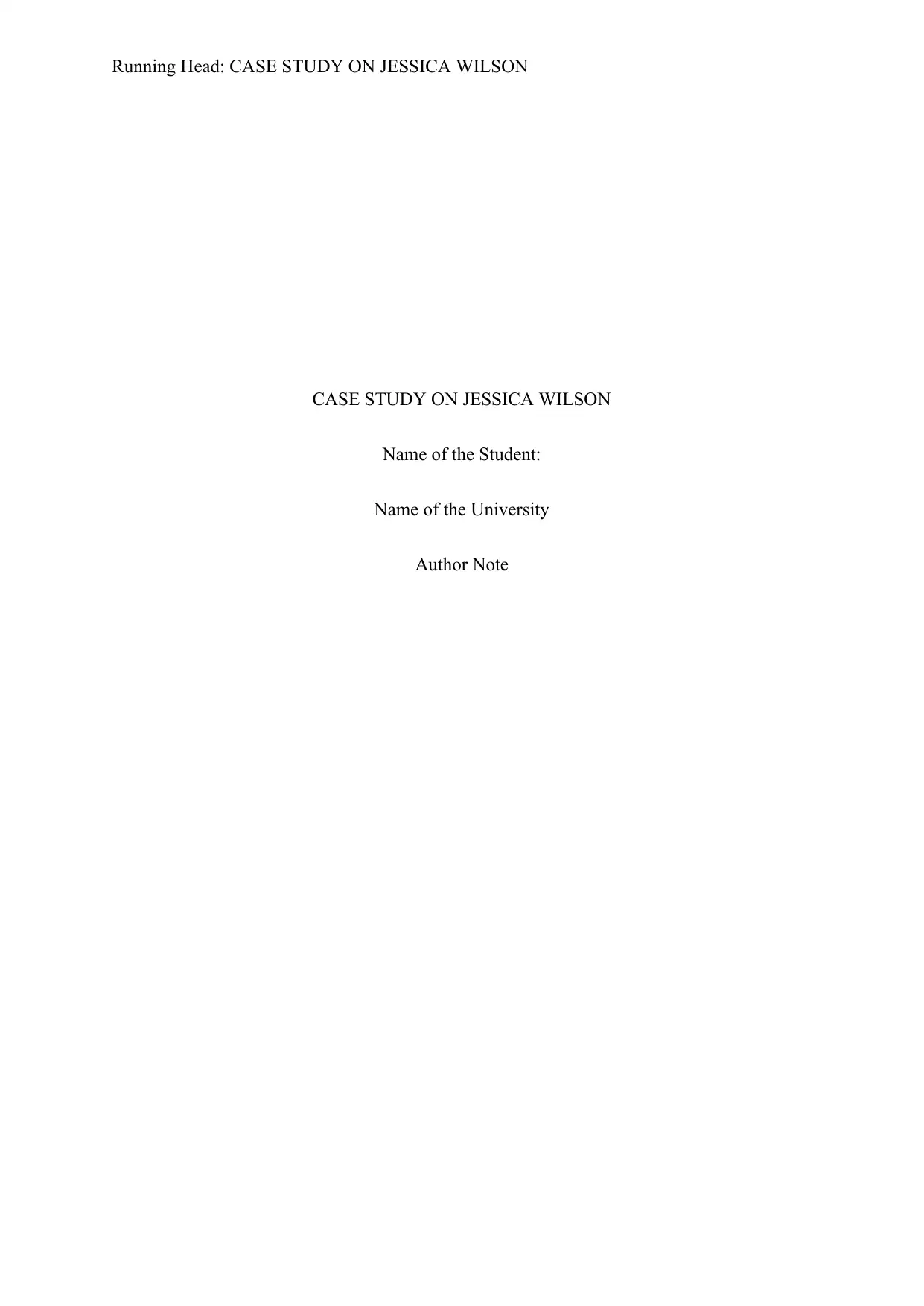
Running Head: CASE STUDY ON JESSICA WILSON
CASE STUDY ON JESSICA WILSON
Name of the Student:
Name of the University
Author Note
CASE STUDY ON JESSICA WILSON
Name of the Student:
Name of the University
Author Note
Paraphrase This Document
Need a fresh take? Get an instant paraphrase of this document with our AI Paraphraser
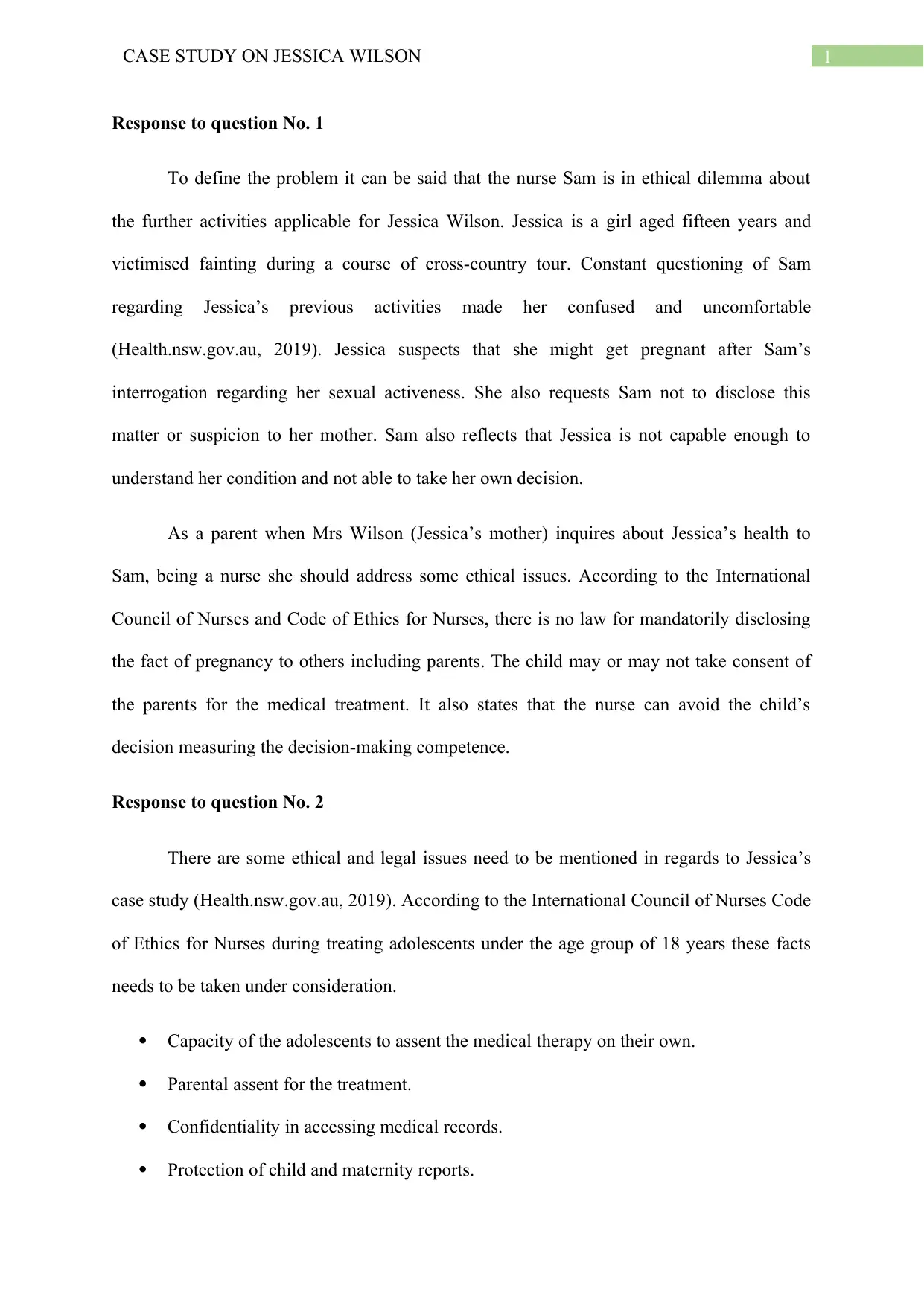
1CASE STUDY ON JESSICA WILSON
Response to question No. 1
To define the problem it can be said that the nurse Sam is in ethical dilemma about
the further activities applicable for Jessica Wilson. Jessica is a girl aged fifteen years and
victimised fainting during a course of cross-country tour. Constant questioning of Sam
regarding Jessica’s previous activities made her confused and uncomfortable
(Health.nsw.gov.au, 2019). Jessica suspects that she might get pregnant after Sam’s
interrogation regarding her sexual activeness. She also requests Sam not to disclose this
matter or suspicion to her mother. Sam also reflects that Jessica is not capable enough to
understand her condition and not able to take her own decision.
As a parent when Mrs Wilson (Jessica’s mother) inquires about Jessica’s health to
Sam, being a nurse she should address some ethical issues. According to the International
Council of Nurses and Code of Ethics for Nurses, there is no law for mandatorily disclosing
the fact of pregnancy to others including parents. The child may or may not take consent of
the parents for the medical treatment. It also states that the nurse can avoid the child’s
decision measuring the decision-making competence.
Response to question No. 2
There are some ethical and legal issues need to be mentioned in regards to Jessica’s
case study (Health.nsw.gov.au, 2019). According to the International Council of Nurses Code
of Ethics for Nurses during treating adolescents under the age group of 18 years these facts
needs to be taken under consideration.
Capacity of the adolescents to assent the medical therapy on their own.
Parental assent for the treatment.
Confidentiality in accessing medical records.
Protection of child and maternity reports.
Response to question No. 1
To define the problem it can be said that the nurse Sam is in ethical dilemma about
the further activities applicable for Jessica Wilson. Jessica is a girl aged fifteen years and
victimised fainting during a course of cross-country tour. Constant questioning of Sam
regarding Jessica’s previous activities made her confused and uncomfortable
(Health.nsw.gov.au, 2019). Jessica suspects that she might get pregnant after Sam’s
interrogation regarding her sexual activeness. She also requests Sam not to disclose this
matter or suspicion to her mother. Sam also reflects that Jessica is not capable enough to
understand her condition and not able to take her own decision.
As a parent when Mrs Wilson (Jessica’s mother) inquires about Jessica’s health to
Sam, being a nurse she should address some ethical issues. According to the International
Council of Nurses and Code of Ethics for Nurses, there is no law for mandatorily disclosing
the fact of pregnancy to others including parents. The child may or may not take consent of
the parents for the medical treatment. It also states that the nurse can avoid the child’s
decision measuring the decision-making competence.
Response to question No. 2
There are some ethical and legal issues need to be mentioned in regards to Jessica’s
case study (Health.nsw.gov.au, 2019). According to the International Council of Nurses Code
of Ethics for Nurses during treating adolescents under the age group of 18 years these facts
needs to be taken under consideration.
Capacity of the adolescents to assent the medical therapy on their own.
Parental assent for the treatment.
Confidentiality in accessing medical records.
Protection of child and maternity reports.
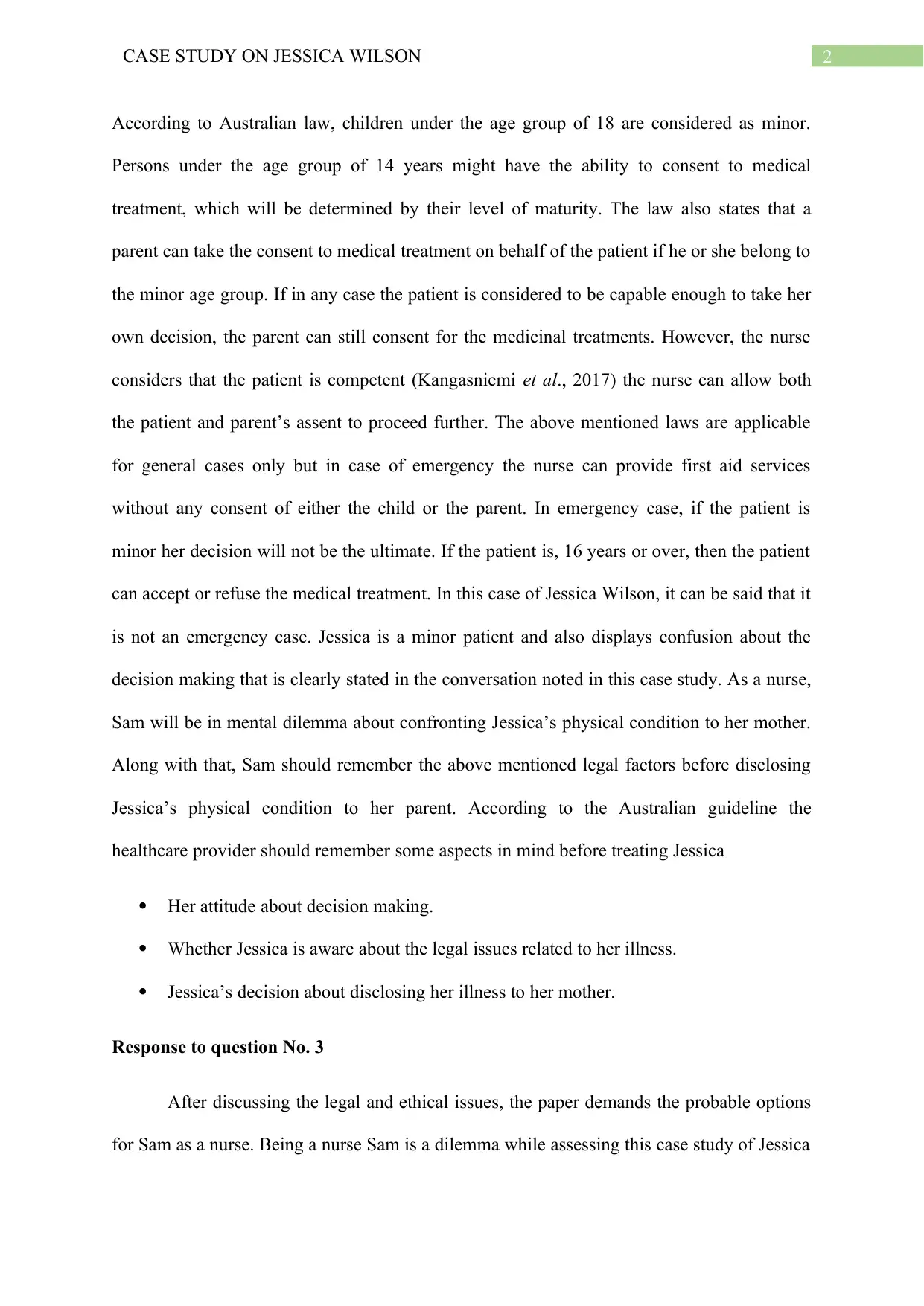
2CASE STUDY ON JESSICA WILSON
According to Australian law, children under the age group of 18 are considered as minor.
Persons under the age group of 14 years might have the ability to consent to medical
treatment, which will be determined by their level of maturity. The law also states that a
parent can take the consent to medical treatment on behalf of the patient if he or she belong to
the minor age group. If in any case the patient is considered to be capable enough to take her
own decision, the parent can still consent for the medicinal treatments. However, the nurse
considers that the patient is competent (Kangasniemi et al., 2017) the nurse can allow both
the patient and parent’s assent to proceed further. The above mentioned laws are applicable
for general cases only but in case of emergency the nurse can provide first aid services
without any consent of either the child or the parent. In emergency case, if the patient is
minor her decision will not be the ultimate. If the patient is, 16 years or over, then the patient
can accept or refuse the medical treatment. In this case of Jessica Wilson, it can be said that it
is not an emergency case. Jessica is a minor patient and also displays confusion about the
decision making that is clearly stated in the conversation noted in this case study. As a nurse,
Sam will be in mental dilemma about confronting Jessica’s physical condition to her mother.
Along with that, Sam should remember the above mentioned legal factors before disclosing
Jessica’s physical condition to her parent. According to the Australian guideline the
healthcare provider should remember some aspects in mind before treating Jessica
Her attitude about decision making.
Whether Jessica is aware about the legal issues related to her illness.
Jessica’s decision about disclosing her illness to her mother.
Response to question No. 3
After discussing the legal and ethical issues, the paper demands the probable options
for Sam as a nurse. Being a nurse Sam is a dilemma while assessing this case study of Jessica
According to Australian law, children under the age group of 18 are considered as minor.
Persons under the age group of 14 years might have the ability to consent to medical
treatment, which will be determined by their level of maturity. The law also states that a
parent can take the consent to medical treatment on behalf of the patient if he or she belong to
the minor age group. If in any case the patient is considered to be capable enough to take her
own decision, the parent can still consent for the medicinal treatments. However, the nurse
considers that the patient is competent (Kangasniemi et al., 2017) the nurse can allow both
the patient and parent’s assent to proceed further. The above mentioned laws are applicable
for general cases only but in case of emergency the nurse can provide first aid services
without any consent of either the child or the parent. In emergency case, if the patient is
minor her decision will not be the ultimate. If the patient is, 16 years or over, then the patient
can accept or refuse the medical treatment. In this case of Jessica Wilson, it can be said that it
is not an emergency case. Jessica is a minor patient and also displays confusion about the
decision making that is clearly stated in the conversation noted in this case study. As a nurse,
Sam will be in mental dilemma about confronting Jessica’s physical condition to her mother.
Along with that, Sam should remember the above mentioned legal factors before disclosing
Jessica’s physical condition to her parent. According to the Australian guideline the
healthcare provider should remember some aspects in mind before treating Jessica
Her attitude about decision making.
Whether Jessica is aware about the legal issues related to her illness.
Jessica’s decision about disclosing her illness to her mother.
Response to question No. 3
After discussing the legal and ethical issues, the paper demands the probable options
for Sam as a nurse. Being a nurse Sam is a dilemma while assessing this case study of Jessica
⊘ This is a preview!⊘
Do you want full access?
Subscribe today to unlock all pages.

Trusted by 1+ million students worldwide
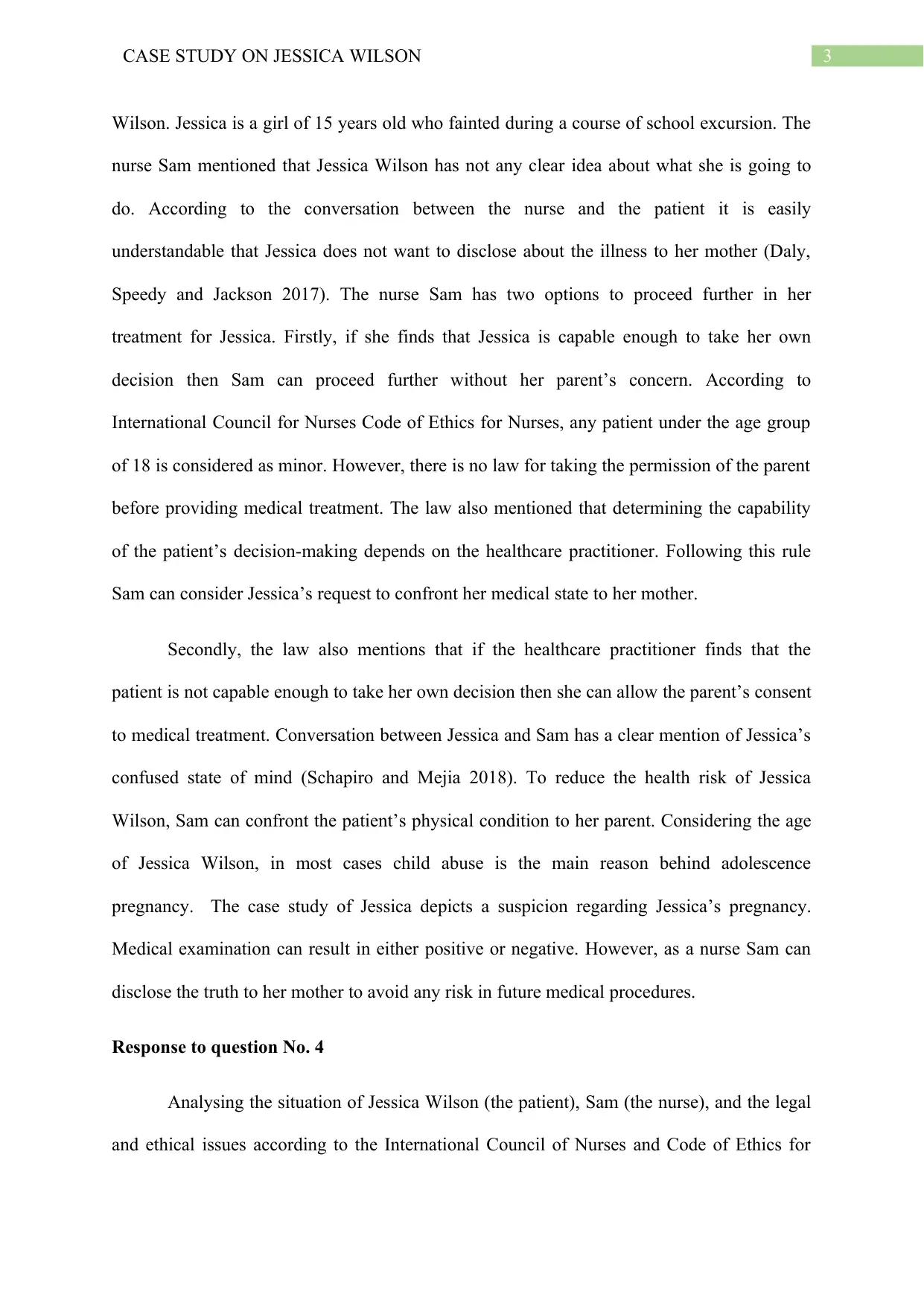
3CASE STUDY ON JESSICA WILSON
Wilson. Jessica is a girl of 15 years old who fainted during a course of school excursion. The
nurse Sam mentioned that Jessica Wilson has not any clear idea about what she is going to
do. According to the conversation between the nurse and the patient it is easily
understandable that Jessica does not want to disclose about the illness to her mother (Daly,
Speedy and Jackson 2017). The nurse Sam has two options to proceed further in her
treatment for Jessica. Firstly, if she finds that Jessica is capable enough to take her own
decision then Sam can proceed further without her parent’s concern. According to
International Council for Nurses Code of Ethics for Nurses, any patient under the age group
of 18 is considered as minor. However, there is no law for taking the permission of the parent
before providing medical treatment. The law also mentioned that determining the capability
of the patient’s decision-making depends on the healthcare practitioner. Following this rule
Sam can consider Jessica’s request to confront her medical state to her mother.
Secondly, the law also mentions that if the healthcare practitioner finds that the
patient is not capable enough to take her own decision then she can allow the parent’s consent
to medical treatment. Conversation between Jessica and Sam has a clear mention of Jessica’s
confused state of mind (Schapiro and Mejia 2018). To reduce the health risk of Jessica
Wilson, Sam can confront the patient’s physical condition to her parent. Considering the age
of Jessica Wilson, in most cases child abuse is the main reason behind adolescence
pregnancy. The case study of Jessica depicts a suspicion regarding Jessica’s pregnancy.
Medical examination can result in either positive or negative. However, as a nurse Sam can
disclose the truth to her mother to avoid any risk in future medical procedures.
Response to question No. 4
Analysing the situation of Jessica Wilson (the patient), Sam (the nurse), and the legal
and ethical issues according to the International Council of Nurses and Code of Ethics for
Wilson. Jessica is a girl of 15 years old who fainted during a course of school excursion. The
nurse Sam mentioned that Jessica Wilson has not any clear idea about what she is going to
do. According to the conversation between the nurse and the patient it is easily
understandable that Jessica does not want to disclose about the illness to her mother (Daly,
Speedy and Jackson 2017). The nurse Sam has two options to proceed further in her
treatment for Jessica. Firstly, if she finds that Jessica is capable enough to take her own
decision then Sam can proceed further without her parent’s concern. According to
International Council for Nurses Code of Ethics for Nurses, any patient under the age group
of 18 is considered as minor. However, there is no law for taking the permission of the parent
before providing medical treatment. The law also mentioned that determining the capability
of the patient’s decision-making depends on the healthcare practitioner. Following this rule
Sam can consider Jessica’s request to confront her medical state to her mother.
Secondly, the law also mentions that if the healthcare practitioner finds that the
patient is not capable enough to take her own decision then she can allow the parent’s consent
to medical treatment. Conversation between Jessica and Sam has a clear mention of Jessica’s
confused state of mind (Schapiro and Mejia 2018). To reduce the health risk of Jessica
Wilson, Sam can confront the patient’s physical condition to her parent. Considering the age
of Jessica Wilson, in most cases child abuse is the main reason behind adolescence
pregnancy. The case study of Jessica depicts a suspicion regarding Jessica’s pregnancy.
Medical examination can result in either positive or negative. However, as a nurse Sam can
disclose the truth to her mother to avoid any risk in future medical procedures.
Response to question No. 4
Analysing the situation of Jessica Wilson (the patient), Sam (the nurse), and the legal
and ethical issues according to the International Council of Nurses and Code of Ethics for
Paraphrase This Document
Need a fresh take? Get an instant paraphrase of this document with our AI Paraphraser
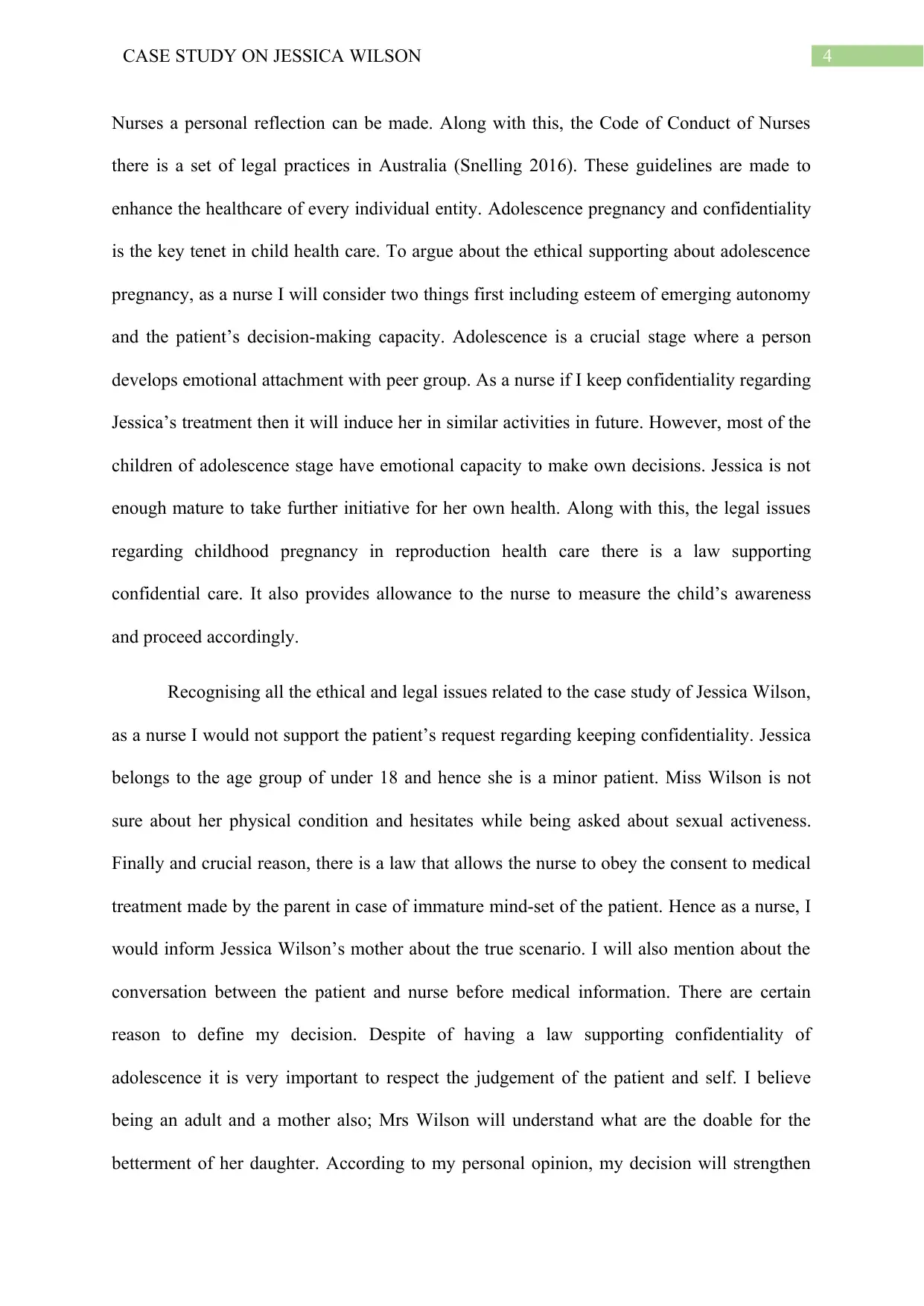
4CASE STUDY ON JESSICA WILSON
Nurses a personal reflection can be made. Along with this, the Code of Conduct of Nurses
there is a set of legal practices in Australia (Snelling 2016). These guidelines are made to
enhance the healthcare of every individual entity. Adolescence pregnancy and confidentiality
is the key tenet in child health care. To argue about the ethical supporting about adolescence
pregnancy, as a nurse I will consider two things first including esteem of emerging autonomy
and the patient’s decision-making capacity. Adolescence is a crucial stage where a person
develops emotional attachment with peer group. As a nurse if I keep confidentiality regarding
Jessica’s treatment then it will induce her in similar activities in future. However, most of the
children of adolescence stage have emotional capacity to make own decisions. Jessica is not
enough mature to take further initiative for her own health. Along with this, the legal issues
regarding childhood pregnancy in reproduction health care there is a law supporting
confidential care. It also provides allowance to the nurse to measure the child’s awareness
and proceed accordingly.
Recognising all the ethical and legal issues related to the case study of Jessica Wilson,
as a nurse I would not support the patient’s request regarding keeping confidentiality. Jessica
belongs to the age group of under 18 and hence she is a minor patient. Miss Wilson is not
sure about her physical condition and hesitates while being asked about sexual activeness.
Finally and crucial reason, there is a law that allows the nurse to obey the consent to medical
treatment made by the parent in case of immature mind-set of the patient. Hence as a nurse, I
would inform Jessica Wilson’s mother about the true scenario. I will also mention about the
conversation between the patient and nurse before medical information. There are certain
reason to define my decision. Despite of having a law supporting confidentiality of
adolescence it is very important to respect the judgement of the patient and self. I believe
being an adult and a mother also; Mrs Wilson will understand what are the doable for the
betterment of her daughter. According to my personal opinion, my decision will strengthen
Nurses a personal reflection can be made. Along with this, the Code of Conduct of Nurses
there is a set of legal practices in Australia (Snelling 2016). These guidelines are made to
enhance the healthcare of every individual entity. Adolescence pregnancy and confidentiality
is the key tenet in child health care. To argue about the ethical supporting about adolescence
pregnancy, as a nurse I will consider two things first including esteem of emerging autonomy
and the patient’s decision-making capacity. Adolescence is a crucial stage where a person
develops emotional attachment with peer group. As a nurse if I keep confidentiality regarding
Jessica’s treatment then it will induce her in similar activities in future. However, most of the
children of adolescence stage have emotional capacity to make own decisions. Jessica is not
enough mature to take further initiative for her own health. Along with this, the legal issues
regarding childhood pregnancy in reproduction health care there is a law supporting
confidential care. It also provides allowance to the nurse to measure the child’s awareness
and proceed accordingly.
Recognising all the ethical and legal issues related to the case study of Jessica Wilson,
as a nurse I would not support the patient’s request regarding keeping confidentiality. Jessica
belongs to the age group of under 18 and hence she is a minor patient. Miss Wilson is not
sure about her physical condition and hesitates while being asked about sexual activeness.
Finally and crucial reason, there is a law that allows the nurse to obey the consent to medical
treatment made by the parent in case of immature mind-set of the patient. Hence as a nurse, I
would inform Jessica Wilson’s mother about the true scenario. I will also mention about the
conversation between the patient and nurse before medical information. There are certain
reason to define my decision. Despite of having a law supporting confidentiality of
adolescence it is very important to respect the judgement of the patient and self. I believe
being an adult and a mother also; Mrs Wilson will understand what are the doable for the
betterment of her daughter. According to my personal opinion, my decision will strengthen
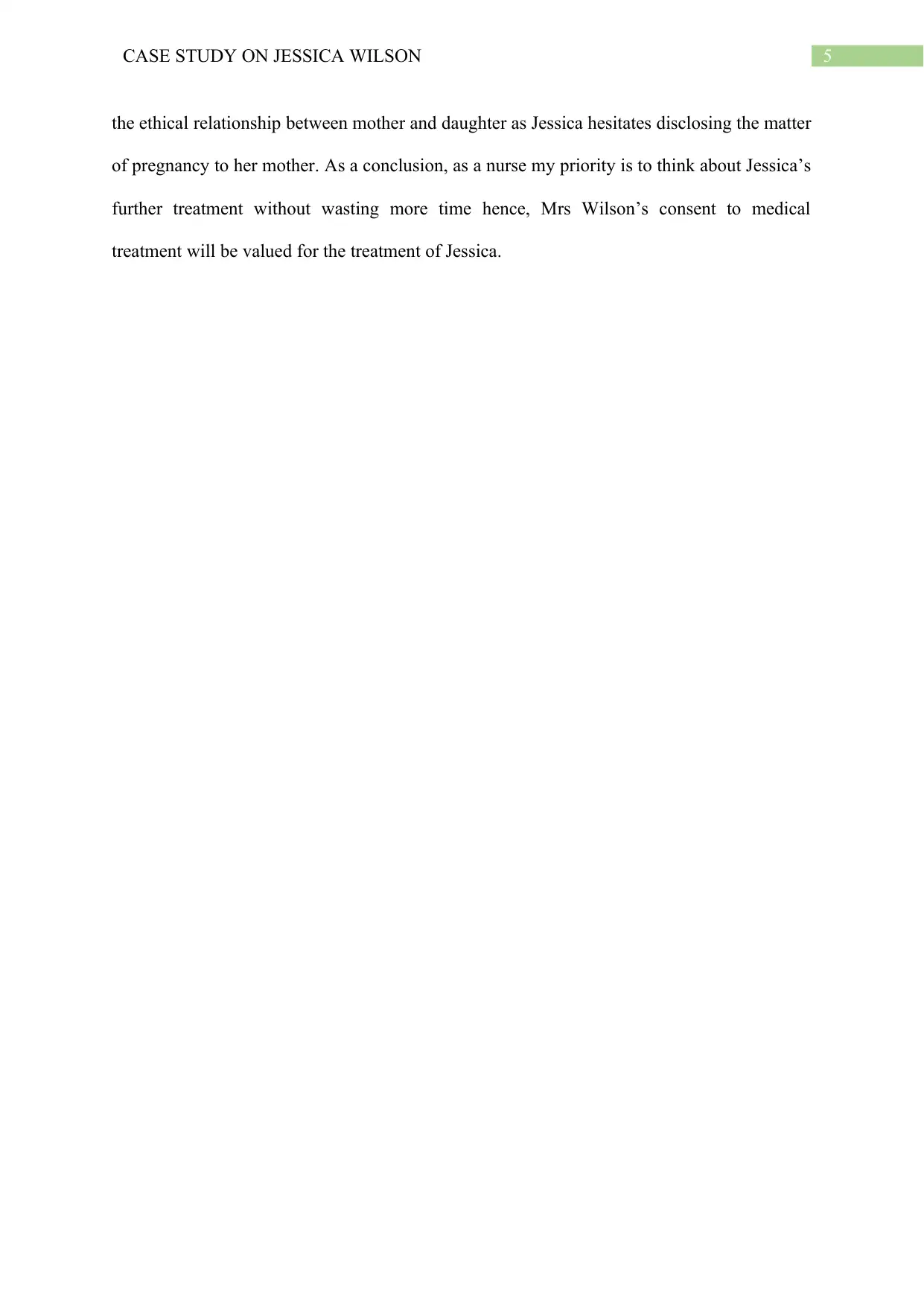
5CASE STUDY ON JESSICA WILSON
the ethical relationship between mother and daughter as Jessica hesitates disclosing the matter
of pregnancy to her mother. As a conclusion, as a nurse my priority is to think about Jessica’s
further treatment without wasting more time hence, Mrs Wilson’s consent to medical
treatment will be valued for the treatment of Jessica.
the ethical relationship between mother and daughter as Jessica hesitates disclosing the matter
of pregnancy to her mother. As a conclusion, as a nurse my priority is to think about Jessica’s
further treatment without wasting more time hence, Mrs Wilson’s consent to medical
treatment will be valued for the treatment of Jessica.
⊘ This is a preview!⊘
Do you want full access?
Subscribe today to unlock all pages.

Trusted by 1+ million students worldwide
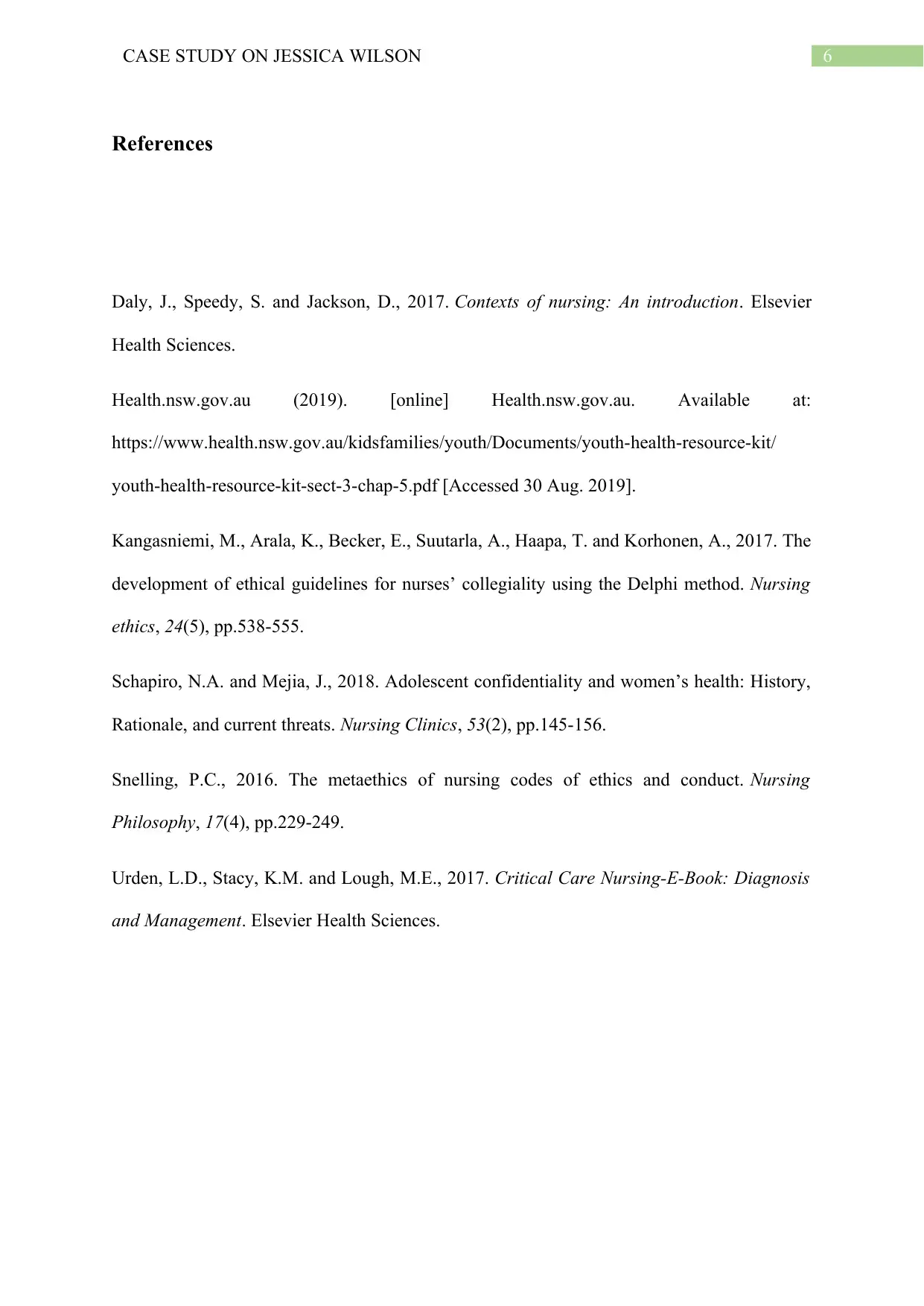
6CASE STUDY ON JESSICA WILSON
References
Daly, J., Speedy, S. and Jackson, D., 2017. Contexts of nursing: An introduction. Elsevier
Health Sciences.
Health.nsw.gov.au (2019). [online] Health.nsw.gov.au. Available at:
https://www.health.nsw.gov.au/kidsfamilies/youth/Documents/youth-health-resource-kit/
youth-health-resource-kit-sect-3-chap-5.pdf [Accessed 30 Aug. 2019].
Kangasniemi, M., Arala, K., Becker, E., Suutarla, A., Haapa, T. and Korhonen, A., 2017. The
development of ethical guidelines for nurses’ collegiality using the Delphi method. Nursing
ethics, 24(5), pp.538-555.
Schapiro, N.A. and Mejia, J., 2018. Adolescent confidentiality and women’s health: History,
Rationale, and current threats. Nursing Clinics, 53(2), pp.145-156.
Snelling, P.C., 2016. The metaethics of nursing codes of ethics and conduct. Nursing
Philosophy, 17(4), pp.229-249.
Urden, L.D., Stacy, K.M. and Lough, M.E., 2017. Critical Care Nursing-E-Book: Diagnosis
and Management. Elsevier Health Sciences.
References
Daly, J., Speedy, S. and Jackson, D., 2017. Contexts of nursing: An introduction. Elsevier
Health Sciences.
Health.nsw.gov.au (2019). [online] Health.nsw.gov.au. Available at:
https://www.health.nsw.gov.au/kidsfamilies/youth/Documents/youth-health-resource-kit/
youth-health-resource-kit-sect-3-chap-5.pdf [Accessed 30 Aug. 2019].
Kangasniemi, M., Arala, K., Becker, E., Suutarla, A., Haapa, T. and Korhonen, A., 2017. The
development of ethical guidelines for nurses’ collegiality using the Delphi method. Nursing
ethics, 24(5), pp.538-555.
Schapiro, N.A. and Mejia, J., 2018. Adolescent confidentiality and women’s health: History,
Rationale, and current threats. Nursing Clinics, 53(2), pp.145-156.
Snelling, P.C., 2016. The metaethics of nursing codes of ethics and conduct. Nursing
Philosophy, 17(4), pp.229-249.
Urden, L.D., Stacy, K.M. and Lough, M.E., 2017. Critical Care Nursing-E-Book: Diagnosis
and Management. Elsevier Health Sciences.
1 out of 7
Related Documents
Your All-in-One AI-Powered Toolkit for Academic Success.
+13062052269
info@desklib.com
Available 24*7 on WhatsApp / Email
![[object Object]](/_next/static/media/star-bottom.7253800d.svg)
Unlock your academic potential
Copyright © 2020–2026 A2Z Services. All Rights Reserved. Developed and managed by ZUCOL.





